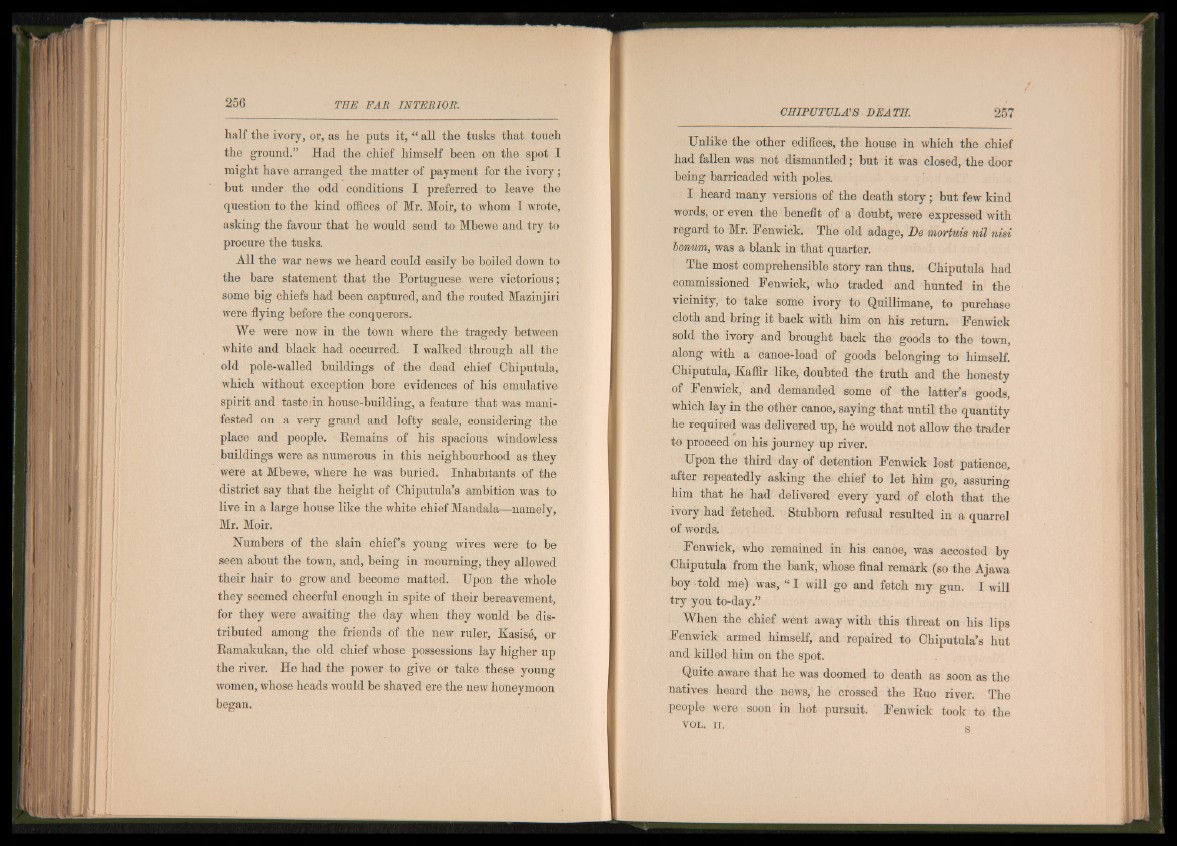
half the ivory, or, as he puts it, “ all the tusks that touch
the ground.” Had the chief himself been on the spot I
might have arranged the matter of payment for the ivory;
but under the odd conditions I preferred to leave the
question to the kind offices of Mr. Moir, to whom I wrote,
asking the favour that he would send to Mbewe and try to
procure the tusks.
All the war news we heard could easily be boiled down to
the bare statement that the Portuguese were victorious;
some big chiefs had been captured, and the routed Mazinjiri
were flying before the conquerors.
We were now in the town where the tragedy between
white and black had occurred. I walked through all the
old pole-walled buildings of the dead chief Chiputula,
which without exception bore evidences of his emulative
spirit and taste'in house-building, a feature that was manifested
on a very grand and lofty scale, considering the
place and people. Eemains of his spacious windowless
buildings were as numerous in this neighbourhood as they
were at Mbewe, where he was buried. Inhabitants of the
district say that the height of Chiputula’s ambition was to
live in a large house like the white chief Mandala—namely,
Mr. Moir.
Numbers of the slain chief’s young wives were to be
seen about the town, and, being in mourning, they allowed
their hair to grow and become matted. Upon the whole
they seemed cheerful enough in spite of their bereavement,
for they were awaiting the day when they would be distributed
among the friends of the new ruler, Kasise, or
Eamakukan, the old chief whose possessions lay higher up
the river. He had the power to give or take these young
women, whose heads would be shaved ere the new honeymoon
began.
Unlike the other edifices, the house in which the chief
had fallen was not dismantled; but it was closed, the door
being barricaded with poles.
I heard many versions of the death story ; but few kind
words, or even the benefit of a doubt, were expressed with
regard to Mr. Fenwick. The old adage, De mortuis nil nisi
bonim, was a blank in that quarter.
The most comprehensible story ran thus. Chiputula had
commissioned Fenwick, who traded and hunted in the
vicinity, to take some ivory to Quillimane, to purchase
cloth and bring it back with him on his return. Fenwick
sold the ivory and brought back the goods to the town,
along with a canoe-load of goods belonging to himself.
Chiputula, Kaffir like, doubted the truth and the honesty
of Fenwick, and demanded some of the latter’s goods,
which lay in the other canoe, saying that until the quantity
he required was delivered up, he would not allow the trader
to proceed on his journey up river.
Upon the third day of detention Fenwick lost patience,
after repeatedly asking the chief to let him go, assuring
him that he had delivered every yard of cloth that the
ivory had fetched. Stubborn refusal resulted in a quarrel
of words.
Fenwick, who remained in his canoe, was accosted by
Chiputula from the bank, whose final remark (so the Ajawa
boy told me) was, “ I will go and fetch my gun. I will
try you to-day.”
When the chief went away with this threat on his lips
Fenwick armed himself, and repaired to Chiputula’s hut
and killed him on the spot.
Quite aware that he was doomed to death as soon as the
natives heard the news, he crossed the Euo river. The
people were soon in hot pursuit. Fenwick took to the
VOL. II . g